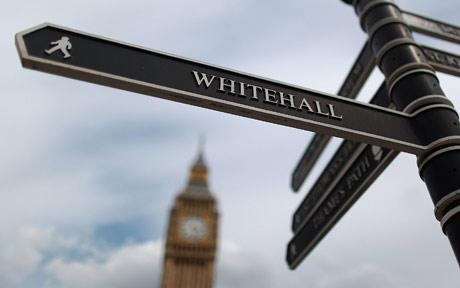Andrew Gilligan is a writer and former No10 adviser to Boris Johnson and Rishi Sunak.
This is not going to be another of those columns attacking the civil service: not quite, anyway. The last government’s failures were mostly ours, not theirs. Almost all the officials with whom I worked in Downing Street and the Treasury, and a fair proportion in the Department for Transport (DfT), ranged from good to superb (I won’t ruin any of their careers by naming them).
But Whitehall, like the police, does have poor top leadership which fails those below them. In my experience, the best civil servants were usually in the junior and middle ranks. Rather than the feline, masterful figures of myth, the permanent secretaries – certainly the one I dealt with most, DfT’s Dame Bernadette Kelly – were often pretty underwhelming.
As Kelly’s departure has finally been announced, it is worth asking how someone with her record could ever have been appointed – and how she then survived for eight years in the post. Her previous job as DfT’s head of rail saw massive investments which should have been a boon turned into fiascos. The Great Western electrification scheme ran so late and so far overbudget that large chunks were permanently abandoned.
DfT (which has micromanaged the railways, rather badly, since long before Covid struck) ended up in the absurd position of actively planning electrifications with massive gaps in them, and buying fleets of trains which had to operate on both electric and diesel power. As specified by Kelly’s team, these are dreadfully inferior in every way to pure electric trains, and substantially worse in ride and comfort than the 1970s diesels, the InterCity 125s, which they replaced. Don’t worry, though – we’ll only be stuck with them for another 40 years.
Schemes in the North of England were also late, and over-complicated new timetables were devised, laying the ground for the 2018 meltdown which halted much of the network for several days, just a year into Kelly’s permanent secretaryship. In that post, in 2019, Kelly achieved the unusual distinction of being censured by parliament’s Public Accounts Committee (PAC) over HS2 – Britain’s greatest-ever procurement disaster – which could, at that stage, have been stopped relatively painlessly if the truth had been known.
Asked by MPs whether the (then) published cost of £55bn was still the cost, she told them she was “not expecting [the figure] to change”. In fact, the committee later discovered that her department had been formally notified by HS2 Ltd two months beforehand that it would not meet the published figure.
As the committee put it, Kelly “withheld from us that the programme was in significant difficulty… even in response to specific questions about the programme’s delivery timeline and budget”. They added that the “failure of an accounting officer to provide accurate information to Parliament is potentially a breach of the Civil Service Code and a breach of parliamentary privilege”. HS2 only got even worse, and even more scandalous.
Kelly’s unsuitability was no exception. From his book, Beyond Britannia, we learn that Sir Simon McDonald – until 2020 the head of the Foreign Office – believes that Britain should not have a permanent seat on the United Nations Security Council, and should give it up to the EU. This, I should stress, is a perfectly legitimate view. But it is incredible, and shows our lack of seriousness as a country, that someone holding it could have been appointed our chief diplomat, with the remit of defending our national interest. It is impossible to imagine any of the other permanent members doing the same.
McDonald was, in effect, fired, though not for his views on the UN. But it is still too difficult to remove bad people. A few months after Kelly’s run-in with PAC, the Johnson government took office and I was made transport adviser. I didn’t jump to conclusions, but after observing her in action for a few months – or in inaction, since she seemed a remarkably passive presence – I did suggest to the secretary of state, Grant Shapps, that she should go.
In our current system, however, it takes a lot of political capital to dismiss a permanent secretary. Shapps preferred to spend that capital differently, and it was rightly his call to make. It is even more difficult, verging on impossible, to move other officials. (We settled on an alternative strategy of taking as much as possible away from DfT altogether, hence the creation of an arms-length body to prise the railways from the department’s dead hand.)
Kelly suffered no consequences for the DfT’s failures under her as that is not the Whitehall way. To the contrary: as well as the routine damehood, she got down to the final two to become permanent secretary at the Ministry of Defence! That at least did get stopped; the thought of her in charge of the nation’s security is not a comforting one.
No chief executive of a company would accept not being able to change any of his management team. No company would select its top leaders as badly as Whitehall does. No industry would lose so many of its best junior and middle-ranking people to the frustrations of poor leadership and inflexible promotion processes. This is not a call to politicise the civil service, or dispense with all institutional knowledge. But reforming these failings will be critical to any new government’s success in office.


![NYC Tourist Helicopter Falls into Hudson River, Siemens Executive and Family Among Those Killed [WATCH]](https://www.right2024.com/wp-content/uploads/2025/04/NYC-Tourist-Helicopter-Falls-into-Hudson-River-Siemens-Executive-and-350x250.jpg)






![Green Day’s Cringe Trump Diss Ends in Fire and Evacuation [WATCH]](https://www.right2024.com/wp-content/uploads/2025/04/Green-Days-Cringe-Trump-Diss-Ends-in-Fire-and-Evacuation-350x250.jpg)
![Red Sox Fan Makes the ‘Catch of the Day’ with Unconventional ‘Glove’ [WATCH]](https://www.right2024.com/wp-content/uploads/2025/04/Red-Sox-Fan-Makes-the-‘Catch-of-the-Day-with-350x250.jpg)





